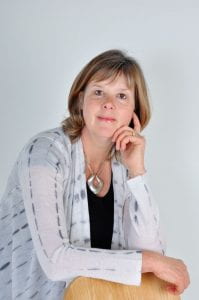
As part of our #BristolUniWomen campaign to mark International Women’s Day 2021, we’re meeting women from across the University of Bristol community who have been using their expertise to tackle the pandemic, from carrying out world-class research to helping on the frontline of the NHS.
Professor Sarah Purdy, Pro Vice-Chancellor for Student Experience, former Head of the Bristol Medical School and part-time GP.
What’s it been like managing a University during a global pandemic?
It’s been incredibly challenging. The uncertainties we’ve all had to face have made decision-making very difficult. I’ve been very aware of the impact this has had on everyone in our community. For staff they have had worries about workload and moving teaching online and, for students they’ve faced financial hardship alongside concerns about their education all combined with the very real health concerns that come with living through a global pandemic.
There’s been a real sense for me of responsibility for everyone and trying to do the very best for them at the same time as realising that we can’t get it right a lot of time because we just don’t know what’s coming round the corner. We sometimes can’t give people the answers they want and that is particularly frustrating at times.
I’ve been so proud of our student leaders. Our sabbatical officers this year have been amazing and inspirational. The SU has done a great job in getting things online in terms of support for students. Across the wider university, we have delivered a really good, blended learning experience. Our support services pivoted overnight to provide services online and we’ve had lots of great feedback. We’re all in this together. There’s been a real sense that students want to contribute and do what they can to work with us in making things better.
You also work a GP. Are there any thoughts or insights from that side of your work?
I’m so proud of what the NHS has done during the pandemic. My contribution is really tiny now. I’m just going in to do one or two sessions a week in general practice, but it’s been great to see how everyone has turned around and delivered services in a different way. Colleagues in hospitals have been doing a great job looking after sick patients. Likewise, in general practice, people have gone the extra mile to make sure patients have really good care despite the fact that it is more difficult to see people face-to-face. I’m amazed at how people have kept going, especially when vaccinations came along. People come in on days off and over weekend. Staff from my practice and others locally gave up their Saturday to help support vaccination clinics for staff at Southmead. That sense of volunteering and community support is inspiring. Everyone is trying to do their bit.
What’s it like being a woman in academia and have there been times when you’ve faced inequality and had to challenge it?
I actually can’t think of many times when being a woman in academia felt different to how a male colleague would feel. Maybe it’s because I work in health and there’s quite a lot of female academics who work in this field. There have been a couple of examples over the years where I’ve had to step up for recognition be that around salary or pushing to get recognition in other ways. I remember when I was Head of the Medical School, I attended a conference, and someone assumed I wasn’t a research active academic, perhaps because I was a woman. I had to say, well actually, I actively contribute to research, teaching and leadership but I wished I had added, ‘because I am a woman’.
It was great when Judith Squires became part of the senior team. It was a strong signal to me as I’d just started as Head of School at the Medical School. Judith is a real role model, and she is a female academic. We now have Tansy Jessop and Lucinda Parr in the senior team which makes for a really positive gender balance. We also have some fantastic female leaders at this university, and I don’t feel that being a woman in a senior role puts me at a disadvantage at all, maybe it even puts me at an advantage.
During your life, are there any women who have particularly inspired you?
I’m covering this at a TheirStories talk I’m giving on Thursday 11 March, so I don’t want to use the same examples. But one woman, who often comes to mind was a psychiatrist I studied under at medical school at Barts Hospital in London. She was incredibly good at her job. She was funny and outspoken. I remember spending time in her clinics and being blown away. She was fearless, often caring for some of the most challenging patients including those in the prison system. Watching her at work was so inspiring. I came from a relatively ordinary background and had never met people like her before. She was so self-assured but in a really good way.
What advice would you give to your 13-year-old self?
Be more confident in your abilities. It took me a long to time to feel that I could put myself forward for opportunities, including applying to medical school. Also, say yes to things assuming they are safe and legal! By doing so, you widen your experiences. If someone asks you to speak at a conference or event, go for it! It’s so important to always try something new.
What are you most proud of?
I’m really proud of the fantastic medical curriculum colleagues produced and delivered under my leadership as Head of School. I also have three lovely kids and I’m very proud of them.
Professor Purdy is giving a TheirStories talk for University of Bristol staff and students on Thursday 11 March, from 1pm to 2pm.
